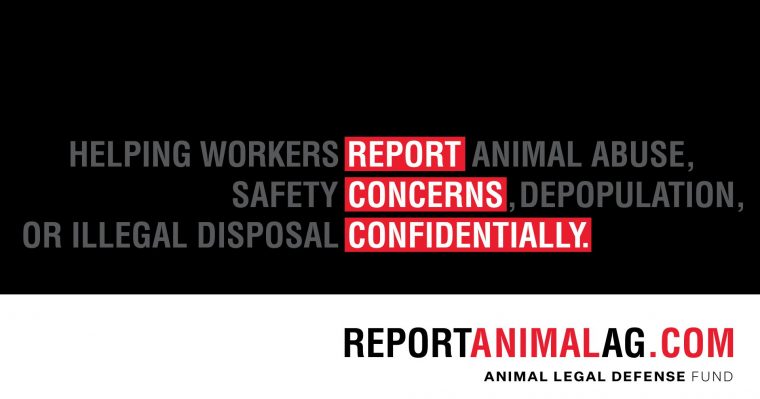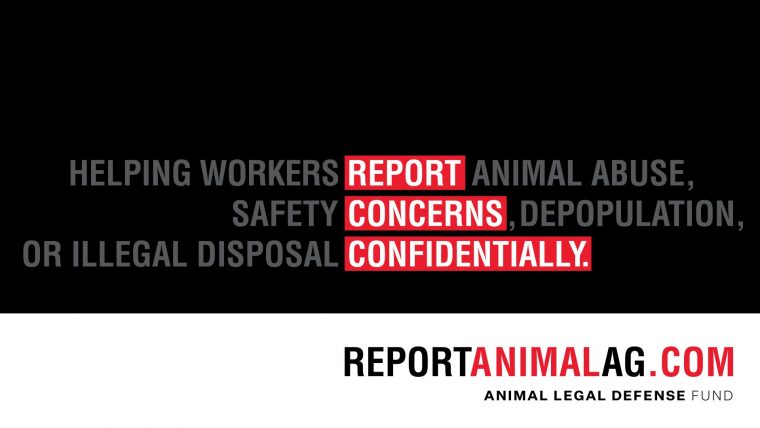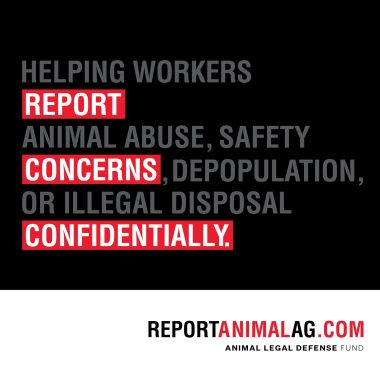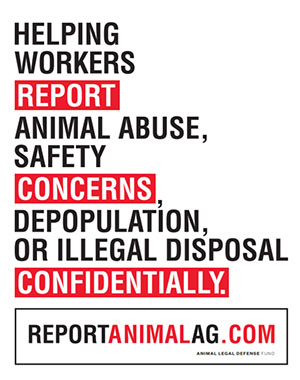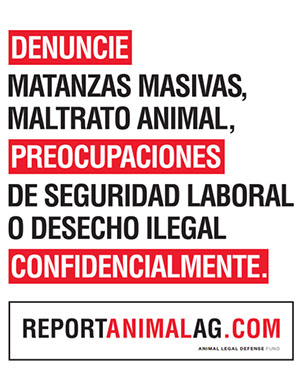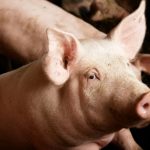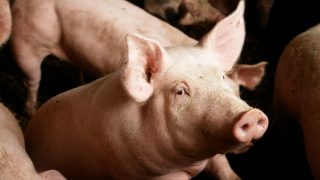
Supporting Industrial Animal Agriculture Whistleblowers
Campaign encourages industrial animal agriculture workers to confidentially report animal abuse, worker safety concerns
In July, the Animal Legal Defense Fund launched a whistleblower campaign to encourage industrial animal agriculture workers to confidentially report animal abuse, worker safety, and other concerns amid the COVID-19 pandemic. The online tip portal — ReportAnimalAg.com — allows individuals to remain anonymous and avoid retaliation.
Forced to work in cramped environments, nearly 40,000 workers have tested positive for COVID-19 and 128 have already died. The pandemic has also upended factory farming’s fragile supply chain. As slaughterhouses temporarily shut down, many animals like chickens and pigs were left in factory farms longer than anticipated. The industry responded with mass killings, suffocating chickens with foam and using ventilation shut down —where animals suffocate and are baked alive in rising temperatures over many hours.
Billboards
Whistleblowers are critical to exposing and stopping these abuses. In partnership with Joaquin Phoenix, the Animal Legal Defense Fund is launching a series of billboards, in Spanish and English, near slaughterhouses and dense farming communities across the country advertising an online tip portal where workers can anonymously report violations.
Billboards are installed or under contract in Greeley, Colorado – near JBS slaughterhouse; Waterloo, Iowa – near Tyson Foods pork plant; Tama, Iowa – near National Beef Packing beef plant; Perry, Iowa – near Tyson Fresh Meats pork processing plant; Sioux Falls, South Dakota – near Smithfield Foods pork processing plant; Springdale, Arkansas – near Tyson Foods poultry plant; Los Angeles, California – near Smithfield Foods pig slaughterhouse; Green Bay, Wisconsin – near JBS Packerland beef plant; Wilkesboro, North Carolina – near Tyson poultry plant; Salisbury, Maryland – near Perdue Farms poultry plant.
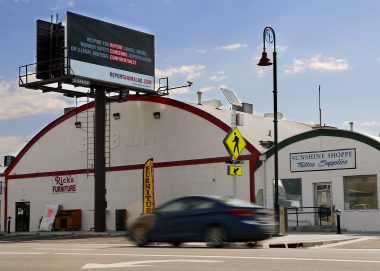
In Greeley, Colorado near the JBS beef slaughterhouse. Twelve employees have died from COVID-19.
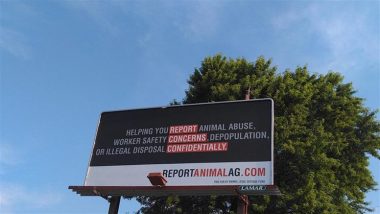
In Waterloo, Iowa near the Tyson Foods pork plant - where over 1,000 employees tested positive for COVID-19.
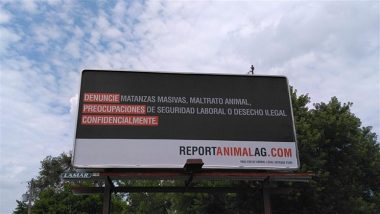
In Tama, Iowa near the National Beef Packing beef plant - where 361 out of 500 employees tested positive for COVID-19.
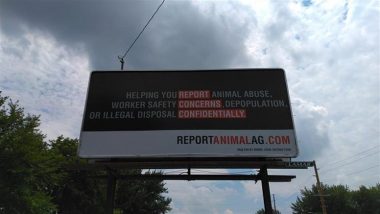
In Tama, Iowa near the National Beef Packing beef plant - where 361 out of 500 employees tested positive for COVID-19.
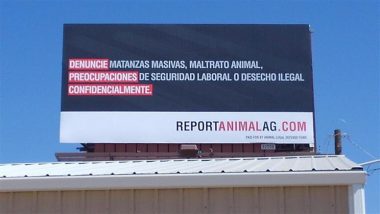
In Greeley, Colorado near the JBS beef slaughterhouse. Twelve employees have died from COVID-19.
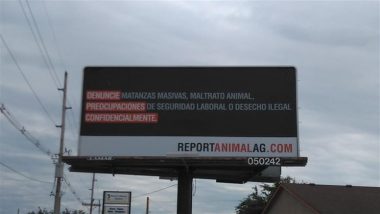
In Perry, Iowa near Tyson Fresh Meats pork processing plant - where 58% of employees tested positive for COVID-19.
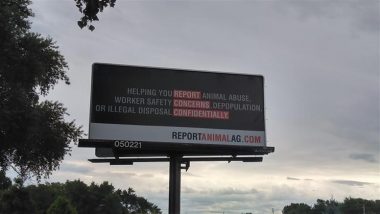
In Perry, Iowa near Tyson Fresh Meats pork processing plant - where 58% of employees tested positive for COVID-19.

In Perry, Iowa near Tyson Fresh Meats pork processing plant - where 58% of employees tested positive for COVID-19.

In Greeley, Colorado near the JBS beef slaughterhouse. Twelve employees have died from COVID-19.
Social Sharegraphics
We need your help to spread the word. Download our whistleblower campaign sharegraphics to let people in your community know that this resource exists.
Click the image to download!
If you work in industrial animal agriculture and have concerns about worker safety, animal abuse, depopulation, or illegal disposal, there’s a new resource for you. Submit an anonymous tip at www.ReportAnimalAg.com, and it will be investigated.
Twitter:
If you work in industrial animal agriculture and have concerns about worker safety, animal abuse, depopulation, or illegal disposal, there’s a new resource for you. Submit an anonymous tip at ReportAnimalAg.com, and it will be investigated. #ReportAnimalAg
If you work in industrial animal agriculture and have concerns about worker safety, animal abuse, depopulation, or illegal disposal, there’s a new resource for you. Submit an anonymous tip at ReportAnimalAg.com, and it will be investigated. #ReportAnimalAg
Flyers
Live in a community with an industrial animal agriculture facility? Download, print, and post our flyers telling people about the online tip portal.
Exploited Workers
The animal agriculture industry profits from exploiting animals and humans alike. Industry workers who labor on factory farms and in slaughterhouses and meatpacking plants earn poverty wages to perform dangerous and traumatic jobs.
On top of this, because of slaughterhouses slowing down and halting processing due to outbreaks of COVID-19 among their workers, factory farm workers have been forced to quickly kill and dispose of thousands or even hundreds of thousands of animals in environments that were never meant for such mass slaughter. Killing animals by foam, gassing, or even ventilation shutdown — turning off air vents and suffocating or cooking the animals to death inside barns — workers must then dispose of the thousands of bodies, including through on-site incineration or mass burial. Having to engage in these large-scale cruelties day after day, in dangerous and dirty environments, exacts a steep physical and psychological toll.
Additionally, there are more than 330,000 workers in slaughterhouses and meatpacking plants across the country. Though COVID-19 has worsened working conditions in these facilities, they have long been rife with human rights violations and exploitation. Even pre-pandemic, working in a slaughterhouse was one of the most dangerous jobs in the United States.
The COVID-19 pandemic has compounded the dangers of working in slaughterhouses and meatpacking plants. These facilities are hotspots for COVID-19 outbreaks due to unsanitary and cramped working conditions, with more than 360 facilities across the country reporting COVID-19 cases. Nearly 35,000 workers have tested positive for COVID-19, and 144 of those workers have died. Meanwhile, the federal government has declined to impose mandatory safety standards on industrial animal agriculture, choosing instead to attempt to force workers to return to work in unsafe conditions. The current administration has also endangered workers by continuing to raise and/or eliminate slaughter line speeds — granting line speed waivers to 15 chicken and turkey slaughterhouses during the month of April alone, at the height of the pandemic.
Report Animal Agriculture
Report animal abuse, worker safety concerns, depopulation, or illegal disposal confidentially.

